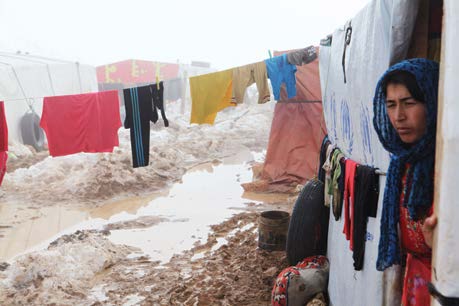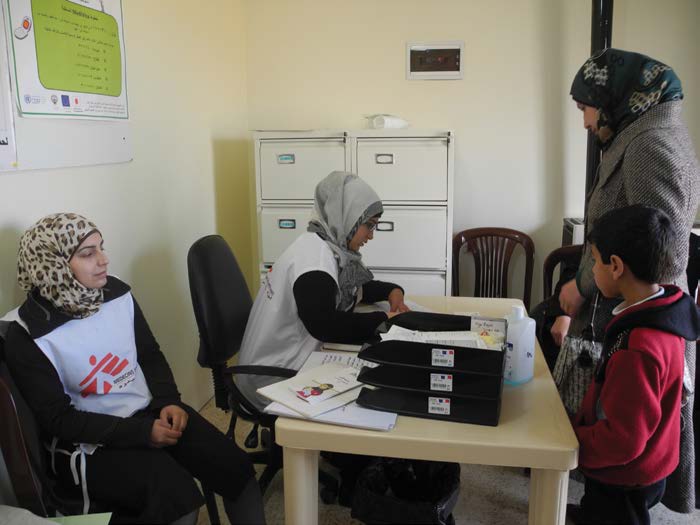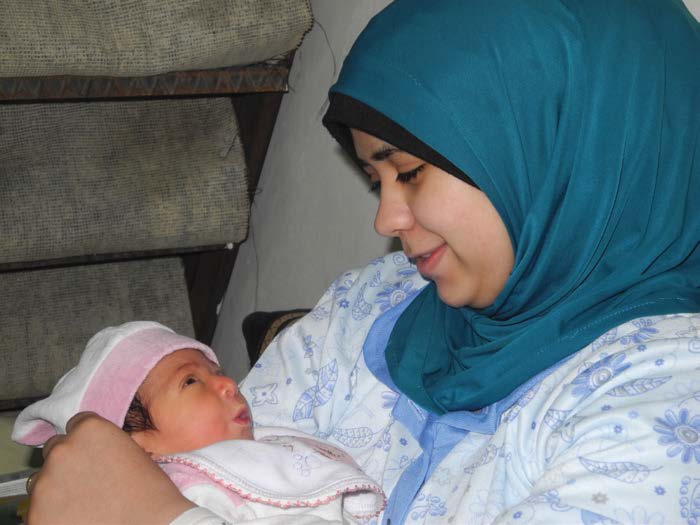Conditions for Syrian refugees in Lebanon are dire and their needs vast. More than a million Syrian refugees have sought refuge here seeking shelter where they can. If it’s winter, they must contend with frigid nights and heavy snowfalls that often collapse their flimsy tents. In summer, they’re exposed to extreme, arid heat. Rains at any time bring floods and mud as well. And, regardless of the month, they have little access to the sort of healthcare so many of them urgently need.
Priced out of care
Of particular concern is the lack of access to free, high-quality healthcare for the tens of thousands of Syrian women giving birth in Lebanon. The Lebanese health system is entirely privatised and highly interventionist. Although the refugees, most of whom live in extreme poverty on less than AU$5 a day, receive a 75 per cent subsidy from UNHCR, the $65 fee they are left with for a straightforward delivery is devastating.
And ‘normal’ deliveries are by no means the norm. More than half of deliveries in most Lebanese clinics are caesarean sections, even if the mother has had previous vaginal deliveries. At a subsidised cost of around $200 or more, the tendency towards caesareans, not uncommon worldwide, results in significant burden for the patient. If she cannot pay, she might be refused access to the hospital or have her refugee card confiscated, which often means no access to food vouchers until the hospital bill is cleared.
The result is that families are faced with a debt they can ill afford, leaving them to borrow from friends and family, send their children out to work instead of school or opt to avoid the clinics altogether and risk unattended homebirths or private midwives with no training. Such stories are very upsetting to me, because I know how dangerous it is and how awful it must be for a mother to give birth scared and alone.
Opening a basic maternity clinic
To respond to this need, Médecins Sans Frontières (MSF) decided to open a second basic emergency obstetric and newborn care (BEmONC) clinic in the Bekaa Valley, close to the single border crossing that allows Syrians to pass into Lebanon, and in an area home to up to 90 000 refugees. I was responsible for all aspects of setting up the clinic: recruiting the staff, training the team and implementing and adjusting the protocols in coordination with the medical advisors at headquarter level, so that the clinic would be ready to receive patients. All contingencies had to be planned for, so I also would wake up at 4am thinking: ‘I need to talk to logistics and pharmacy about the back-up plan for the cold chain’ or ‘what are the pros and cons of keeping a single unit of O-negative blood on site?’

A pregnant woman peers out from her tent home as freezing fog surrounds the Khoder Hawash makeshift settlement for refugees on the outskirts of Baalbek in Lebanon’s Bekaa valley. ©Ghazal Soutoudeh.
My logistics colleagues renovated an existing primary health centre on the outskirts of the town, making the downstairs area suitable for births. As a BEmONC facility we would be offering basic obstetric and neonatal services only, meaning we would not have an operating theatre and would need to transfer complicated cases. Babies born in our unit requiring simple interventions (for example, intravenous antibiotics or management of hypoglycaemia) could also be managed, but more complicated cases would still have to be referred. However, the success of a project like this depends on building a good referral system between lower and higher levels of care. To achieve this, we not only coordinated free transport with the Lebanese Red Cross, but we also provided vouchers for the patients needing transfers, to reduce the barrier of cost for their advanced care.
As it was winter, with snow all around, and the Lebanese electricity supply is highly unpredictable, a large generator and oil burners were essential. Looking out the clinic window at the snowy peaks, I often wondered how our patients survived their pregnancies with nothing but a bit of plastic sheeting to protect them from the cold.
Training and protocols
Preparing the team and cementing protocols for the clinic involved revisiting my training and what was considered standard practice back home. In Australia we work very hard, with big financial investments, to make small improvements. This is because the standard of care is already so good, patient expectations are high and neonatal mortality is so low. In Lebanon the challenges were different. The national staff midwives are all used to working in a hospital system where only doctors do deliveries. Caesarean sections are common and there is a lot of monitoring and ultrasound. I would consider many of these practices to be outside of evidence-based medicine.
The MSF approach is somewhere in between. MSF midwives are trained to perform the whole delivery, including perineal repair, postnatal care and discharge of the mother and baby once safety criteria are met. They are expected to be able to detect risk factors and call the doctor when complications occur. Overall, there is a strong push towards achieving safe, normal delivery with the introduction of simple and effective interventions, resulting in significant reductions in maternal and neonatal mortality.

Setting up the clinic involved training local staff and establishing appropriate evidence-based protocols. ©Jinane Saad/MSF.
Being able to call on my training to implement measures with a high impact was incredibly rewarding. In Australia, routine management of the third stage of labour requires an injection of oxytocin and controlled cord traction. This simple intervention halves the chances of having a postpartum haemorrhage. It is standard, evidence-based practice in Australia and also for MSF, but it wasn’t part of hospital policy in Lebanon. It was both a pleasure and a challenge for me to guide the introduction of this to our clinic and demonstrate to our team the impact it had.
I decided to become an obstetrician because to me it was the perfect way to combine medical skills with humanity and kindness. Aid work presented an opportunity to apply these skills to help people when they are most vulnerable. My first patient in the newly opened maternity clinic was a 16-year-old Syrian refugee. I know it sounds clichéd, but seeing that baby being born on our first Saturday morning meant everything to me. It wasn’t just the success of the birth –a vaginal delivery resulting in a healthy baby girl – it was seeing our team of national staff in action. They were incredible. Clearly all those weeks of training and practice paid off.
In Lebanon, we had two months to open a clinic and get the team working to MSF standards of care. This required them adapting to new ways of working and letting go some of the old. However, when I walked in to the clinic that first Saturday morning to find everything set up perfectly from the neonatal resuscitation unit and the notes on the whiteboard, I could see how far we had come. Not only did I feel privileged to contribute to offering health and dignity to Syrian refugees, I also felt confident that this dedicated team would give women a quality of intrapartum care I would be proud of here in Australia.

Hasnaa, who is 16 years old, and her newborn resting at home after delivery at MSF’s new maternal and child centre in Majdal Anjar, Lebanon. ©MSF.
About MSF in Lebanon
MSF first started working in Lebanon in 1976, providing medical assistance in response to the outbreak of civil war. It currently provides primary healthcare – including treatment for acute and chronic diseases – in Tripoli, the Bekaa Valley, Beirut and Sidon. MSF also operates mother-and-child services in the Bekaa Valley and the Shatila Palestinian refugee camp. MSF’s services are open to Syrian refugees, vulnerable Lebanese, Lebanese returnees from Syria, and Palestinian refugees from Syria. MSF treats all Syrian refugees irrespective of their registration status with UNHCR.
Working for MSF
MSF Australia is currently looking for qualified gynaecologists and obstetricians who are able to commit to a minimum of six weeks to work in the field. For more information, please visit: www.msf.org.au/recruitment.
Trainees (PGY3+) are eligible for general medical doctor roles. These roles require a minimum availability of nine months. Completion of specialty training is not mandatory before applying and there is potential for some placements to be accredited towards training (fully or partially) with reference to the FRANZCOG Training in Resource Limited Settings Guidelines: http://www.ranzcog.edu.au/additional-information-on-training-a-training-posts/franzcog-training-in-resource-limited-settings-overseas-guidelines.html. Applications for MSF field placements to be accredited towards training are assessed on a case-by-case basis by Chair of the relevant Regional TAC and the Chair of the RANZCOG TAC.





Leave a Reply